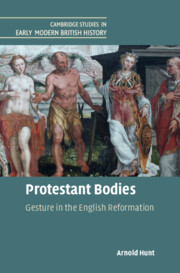Book contents
- Protestant Bodies
- Cambridge Studies in Early Modern British History
- Protestant Bodies
- Copyright page
- Epigraph
- Contents
- Illustrations
- Preface and Acknowledgements
- Abbreviations
- Introduction
- Chapter 1 Passion and Persuasion
- Chapter 2 Repentance
- Chapter 3 Subjection
- Chapter 4 Blessing and Protection
- Chapter 5 Deference and Civility
- Chapter 6 Reverence
- Conclusion
- Bibliography
- Index
Chapter 2 - Repentance
Penance and Reconciliation
Published online by Cambridge University Press: 20 February 2025
- Protestant Bodies
- Cambridge Studies in Early Modern British History
- Protestant Bodies
- Copyright page
- Epigraph
- Contents
- Illustrations
- Preface and Acknowledgements
- Abbreviations
- Introduction
- Chapter 1 Passion and Persuasion
- Chapter 2 Repentance
- Chapter 3 Subjection
- Chapter 4 Blessing and Protection
- Chapter 5 Deference and Civility
- Chapter 6 Reverence
- Conclusion
- Bibliography
- Index
Summary
Chapter 2 deals with the rituals of penance and reconciliation. These took two main forms: the ritual of public penance prescribed by the church courts for the readmission of excommunicated persons, and the more informal rituals of reconciliation in which individuals settled interpersonal conflicts and disagreements. Public penance has often been neglected by historians of the English Reformation, who have tended to echo the complaints of puritan critics that it fell short of a fully reformed system of discipline. Yet it deserves more attention as one of the few religious rituals in which the laity, rather than the clergy, took the leading role. This chapter argues that it was flexible and effective and that it resembled, more closely than has generally been realised, the consistorial system used in the Scottish and Continental Reformed churches. It also argues that penance and reconciliation were performative rituals which depended for their validity as much on gestures as on words. They were social interactions, in which an apology had to be both offered and accepted in order for the reconciliation to take effect, and in which the body language of the penitent was closely scrutinised for signs of genuine remorse.
- Type
- Chapter
- Information
- Protestant BodiesGesture in the English Reformation, pp. 83 - 117Publisher: Cambridge University PressPrint publication year: 2025

